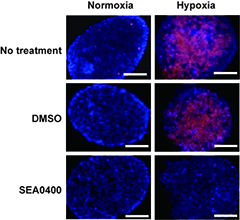
Pancreatic islet transplantation is an attractive therapy for the treatment of insulin-dependent diabetes miellitus, or Type 1 diabetes, a disease characterized by the loss of the insulin-producing beta cells of the islets of Langerhans in the pancreas, which leads to insulin deficiency.
A new study by an international team including researchers from Fukuoka University, the RIKEN Center for Integrative Medical Sciences and other institutions in Japan reveals that treating pancreatic islets from donor patients before transplantation with a key calcium channel inhibitor improves transplantation outcomes in mice.
The researchers show that the sodium-calcium exchanger NCX is involved in cell death events that occur in pancreatic islets following transplantation and eventually lead to failure of the transplantation.
But cell death can be avoided by pretreating islets with an NCX inhibitor prior to transplantation, which results in the long-term survival of both human and mouse islets after they are grafted into mice.
These findings suggest a new strategy to improve the efficiency of islet transplantation for the treatment of diabetes.
The study is published in the American Journal of Transplantation, DOI: 10.1111/ajt.12306
